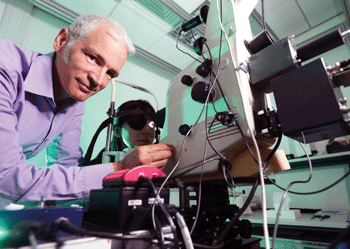Tom Margrain, PhD, MCOptom, of Cardiff University School of Optometry, helped develop this retinal densitometer, which can measure early AMD with great accuracy. Photo: UK Astronomy Technology Centre.
Engineers at the UK Astronomy Technology Centre (UK ATC) are used to applying their expertise to develop instruments capable of studying light from distant galaxies. But now they have collaborated with scientists at Cardiff University’s School of Optometry and Vision Sciences to create an instrument that could potentially revolutionize the detection and treatment of age-related macular degeneration.

The instrument, known as a retinal densitometer, is capable of detecting early signs of AMD by measuring how the eye responds to light.
Retinal densitometry itself is not a new concept, but the novel, video-based device developed by the UK ATC and Cardiff University’s Macular Disease Study Group is the first of its kind. The instrument uses technology typically associated with astronomy to measure reflectance of light in the retina, giving it the potential to provide doctors with a map of retinal function.
Reduced sensitivity to light is one of the early signs of AMD. By exposing rod and cone photopigments to bright light, and then shutting off the light, the retinal densitometer measures the duration of “dark adaptation”—the recovery of visual function in the dark.
Preliminary tests on 10 control subjects and 10 patients with early-stage AMD have shown that this technology can measure light changes with great accuracy, and that it has a high ability to distinguish between affected and non-affected groups.

